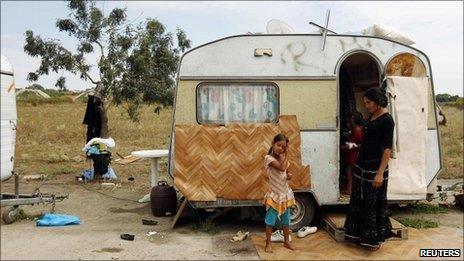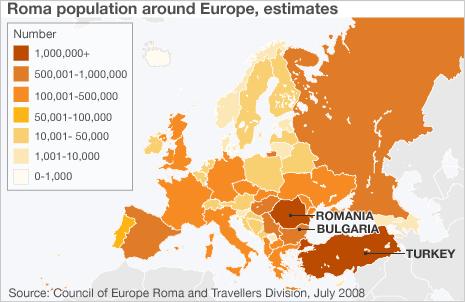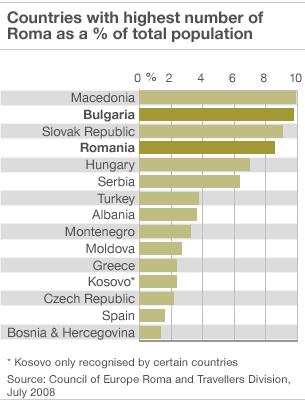Q&A: France Roma expulsions
- Published
France is controversially deporting Romanian and Bulgarian Roma (Gypsies) as part of a crackdown on illegal camps in the country.
The trigger was a clash in July between French Roma and police in the town of Saint Aignan. France's deportations have been widely criticised in the EU.

The government says it will dismantle 300 illegal camps and squats
What prompted the latest government action?
In July, dozens of French Roma armed with hatchets and iron bars attacked a police station, hacked down trees and burned cars in the small Loire Valley town of Saint Aignan.
The riot erupted after a gendarme shot and killed a French Roma, 22-year-old Luigi Duquenet, who officials said had driven through a police checkpoint, knocking over a policeman. Media reports suggested he had been involved in a burglary earlier that day.
Duquenet's family dispute the police version of events, saying he was scared of being stopped because he did not have a valid driver's licence.
The night before, there were riots in Grenoble after police shot an alleged armed robber during a shootout.
French President Nicolas Sarkozy called an emergency ministerial meeting, at which it was decided that some 300 illegal camps and squats would be dismantled within three months.
A statement from the president's office said the camps were "sources of illegal trafficking, of profoundly shocking living standards, of exploitation of children for begging, of prostitution and crime".
Dozens of camps have since been shut down. Those found to be living illegally in France are being sent home.
The move is part of a raft of new hardline security measures recently announced by the government, which has struggled with low approval ratings in the opinion polls.
Has this happened before?
In fact, France has closed down illegal Roma camps and sent their inhabitants home for years. Last year 10,000 Roma were sent back to Romania and Bulgaria, the government says.
What is the EU doing about it?
EU Justice Commissioner Viviane Reding described the deportations as a "disgrace" and the European Commission took a first step towards legal action against France.
On 29 September the Commission told France that it had two weeks to start implementing a 2004 EU directive on freedom of movement, external. France was warned that it would face an official EU "infringement procedure" if it failed to do so. The directive sets out rules for deportation cases.
On 19 October Ms Reding said she was satisfied that France had responded "positively" to the Commission's official request. The Commission decided not to pursue the infringement procedure.
The Commission refrained from opening a case against France for alleged discrimination, instead demanding more proof to support France's claim that it was not deliberately targeting Roma.
Wholesale action against an ethnic minority would violate EU anti-discrimination laws, including the Charter of Fundamental Rights, external.
In a speech to the European Parliament in September Ms Reding deplored the fact that a leaked official memo had contradicted assurances given to her by France that the Roma were not being singled out.
"This is a situation I had thought Europe would not have to witness again after the Second World War," she said.
Many MEPs also condemned France's deportations.
The Commission has set up a task force to examine how EU funds earmarked for Roma are being spent. It is also checking to see whether any other member states are violating EU rules in their treatment of Roma.
Has there been criticism elsewhere?
Yes. The European Roma Rights Centre said Mr Sarkozy's plan "reinforces discriminatory perceptions about Roma and travellers and inflames public opinion against them".
Romanian President Traian Basescu said he understood "the problems created by the Roma camps outside the French cities" but he insisted on the "right of every European citizen to move freely in the EU".
The UN's Committee on the Elimination of Racial Discrimination sharply criticised France's crackdown and said racism and xenophobia were undergoing a "significant resurgence".
The Vatican and other Church leaders have also voiced concern.
Who are the Roma, and how many Roma are there in France?
The Roma are a nomadic people whose ancestors are thought to have left north-west India at the beginning of the 11th Century and scattered across Europe.

There are at least 400,000 Roma - or travelling people - living in France, who are part of long-established communities.
In addition, there are about 12,000 Roma from Bulgaria and Romania, many of whom live in unauthorised camps in urban areas across the country, according the French Roma rights umbrella group FNASAT.
Romania and Bulgaria joined the EU in 2007, don't their citizens have freedom of movement within the EU?
They have the right to enter France without a visa, but under special rules they must have work or residency permits if they wish to stay longer than three months.
These are hard to come by, and most Roma from the two countries are thought to be in France illegally.
Nine other EU states also have restrictions in place, typically requiring work permits.
From January 2014, or seven years after the two countries' accession, Romanians and Bulgarians will enjoy full freedom of movement anywhere in the EU.

Is France united behind the deportations?
French Interior Minister Brice Hortefeux said the new measures were "not meant to stigmatise any community, regardless of who they are, but to punish illegal behaviour".
The government said the measures were in line with European rules. Opinion polls suggest that as many as 65% of French people back the government's tough line.
Foreign-born Roma are often seen begging on the streets of France's cities, and many French people consider them a nuisance.
French opposition parties have condemned the deportations and Mr Sarkozy has faced dissent in his cabinet, too.
Foreign Minister Bernard Kouchner said he was "shocked" by the government's focus on people of foreign origin, while Defence Minister Herve Morin said any programme based purely on police repression was doomed to fail.
A member of Mr Sarkozy's own UMP party, Jean-Pierre Grand, a centre-right politician, compared police round-ups of the Roma in camps to the large-scale arrests, known in French as "rafles", of French Jews and Gypsies during World War II.
What will happen to the Roma who have been sent home?
Bulgarian and Romanian Roma face discrimination at home, and Roma communities in both countries have faced forced evictions.
Generally, they have a low standard of living, high unemployment and low literacy levels.
Some Roma threatened with deportation say that if they are sent home, they will simply come back.